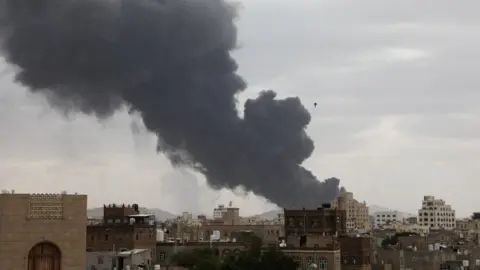In a significant escalation of tensions in the Middle East, an Israeli airstrike targeted Sanaa International Airport in Yemen’s capital on May 6, 2025. This military action was confirmed by the Israel Defense Forces (IDF), marking another chapter in the ongoing conflict involving the Iran-aligned Houthi group. They have been engaged in a protracted war in Yemen, which has seen various international players involved, complicating an already dire humanitarian situation.
Earlier that day, the IDF had issued a warning urging civilians to evacuate the airport area, stressing that those who did not comply could face significant danger. This strike followed Israeli attacks on Houthi targets in the nearby city of Hudaydah just a day prior. The Israeli military’s actions appear to be retaliatory, spurred by a missile launched by the Houthi group that landed alarmingly close to Israel’s Ben Gurion Airport, near Tel Aviv, just the day before.
Israel has previously conducted multiple military operations against the Houthis, who have frequently launched missiles into Israeli territory. The IDF reported that one of the key targets of their operations has been a power plant and ports in Yemen, with significant military operations noted in January. This latest airstrike on Sanaa’s airport is not without precedent; another similar attack was carried out last December, pointing to a sustained campaign against the Houthi forces.
The attacks have not only caused physical damage but also highlighted the strategic importance of the location. The ports of Yemen, particularly Hudaydah, are critical as they serve as a crucial entry point for about 80% of the country’s food imports. Notably, the IDF stated that their airstrike targeted locations that were believed to be facilitating the Houthi group’s military logistics, including the alleged transfer of Iranian arms.
According to a spokesperson for the Houthi-controlled health ministry, Anees al-Asbahi, the latest airstrikes have resulted in at least 21 injuries. The Houthi leadership has sought to deflect blame for the escalation toward the United States and Israel, claiming that their coordinated attack represented a direct response to perceived aggressions. However, a U.S. defense official has denied any involvement in the recent strikes against Yemen, insisting that American forces did not participate.
In a public response, Israeli Prime Minister Benjamin Netanyahu vowed to continue targeting the Houthi militants in retaliation for any attacks launched against Israel. He stated, “We attacked in the past, and we will attack in the future,” solidifying the narrative of ongoing hostilities and potential escalation in both air and ground operations.
The conflict has deeply entrenched itself within the wider geopolitical climate of the Middle East, where alliances can shift rapidly. After the missile assault on Ben Gurion Airport, the Houthis declared their intention to impose a “comprehensive aerial blockade” on Israel. This assertion underlines the volatile nature of the situation; the Houthis are preparing to escalate their military capabilities in response to Israeli actions in Gaza, creating a potentially dangerous regional conflict.
As both sides prepare for possible retaliation and further military engagement, the situation remains fraught with risk for civilians caught in the crossfire. The ongoing conflicts not only destabilize the immediate regions but carry implications that may resonate across various international borders, affecting not just the countries directly involved but also broader global peace and stability efforts.



